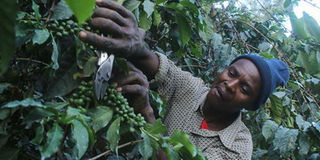We can use ICT to revamp coffee industry

Hudson Wachira prunes his coffee bushes at Kangocho in Nyeri County on April 5, 2018. PHOTO | FILE | NATION MEDIA GROUP
What you need to know:
- The farmer requires appropriate tools to boost productivity and access finance and critical information about the market.
- Technology can also be used to aggregate numerous other crops, creating economies of scale for local value addition.
Coffee, once touted as Kenya’s ‘black gold’, still ranks among the top exports and is hailed as being among the best.
Millions of Kenyans depend on coffee for a livelihood. Unfortunately, the fortunes of the industry have waned.
Many coffee farmers have embraced other crops that promise better returns, such as tea, macadamia, avocado and strawberry.
That could be attributed to declining productivity, expensive inputs, lack of access to credit and shifting attitudes to coffee farming.
Moreover, the older generation may have keenly embraced coffee farming but younger Kenyans seem to shun it. They are leaving the rural areas in droves to look for jobs in towns and cities.
ICT
In tackling the myriad challenges the industry faces, let’s first address productivity and access to credit and markets by putting the farmer at the centre of the equation.
The farmer requires appropriate tools to boost productivity and access finance and critical information about the market. Information technology is one such tool.
Fortunately, ICT uptake in Kenya is impressive, even by global standards, as evidenced by breakthroughs such as M-Pesa. Replicating that in coffee should be easy if we sensitise the farmer.
The recent automation of the coffee auction system by the Ministry of Agriculture and the Nairobi Coffee Exchange is, therefore, encouraging.
It will enhance transparency as farmers and agents can access instant market reports.
INNOVATION
If only half of the more than 700,000 coffee farmers embraced ICT platforms and applications, we could radically transform the industry and revolutionise the agricultural sector.
Technology can also be used to aggregate numerous other crops, creating economies of scale for local value addition.
This is the rationale behind a project spearheaded by the Kenya Planters Cooperative Union (KPCU).
The innovative app enables farmers to get services from KPCU more easily and also provides the miller with valuable data about the farmer right from the farm.
The big idea is to link farmers to accessible and affordable inputs and credit, which are critical needs.
Given the convenience of the mobile phone, many farmers can devote more of their time to tending their crop as opposed to travelling to cooperatives and KPCU offices for assistance.
YOUTH
Declining productivity and output has made coffee farming a risky bet for credit providers; therefore, the next phase will involve connecting farmers and financial and credit institutions.
The system will finally provide direct linkages to local and international coffee markets, ensuring that all intermediaries in the value chain earn only a commission, based on the final produce value, as opposed to making large margins at the expense of the farmer.
ICT can also make coffee farming look ‘cool’ to the youth.
Mr Wachira is the managing director of KPCU. [email protected].



